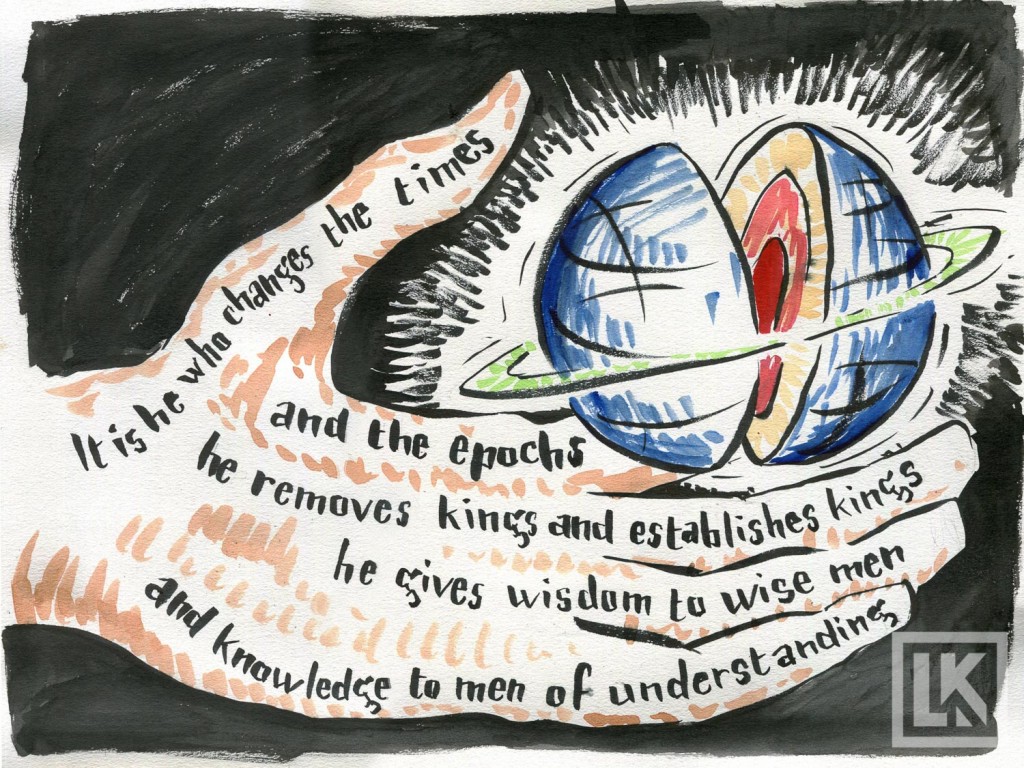Daniel quickly distinguishes himself from the men of Babylon. He is loyal to his God. He is wise beyond his years. He can even interpret visions and dreams—accurately. Daniel’s gifts are from the God of Israel, and the young man becomes a living testimony to his God in a strange land.
Daniel also has vivid, symbolic visions about the future of Israel, world kingdoms, and the kingdom of God—exposing us to some of God’s long-term plan for the world.
The book of Daniel is about how God shows His everlasting wisdom, power, and faithfulness through one of Israel’s greatest prophets.
- God’s wisdom is pervasive in the book of Daniel. In God’s wisdom, Daniel was brought to Babylon to give counsel. Through God’s wisdom, Daniel is proven to be a trustworthy prophet, even capable of interpreting other people’s dreams—a gift only shared by Joseph in Genesis (Gn 41:15) and an unnamed man in Judges (Jdg 7:13–14). Daniel attributes his vast wisdom, insight, and understanding to his wise God (Dan 2:28).
- Daniel puts God’s sovereignty is on display. The God of Israel is consistently called the Most High God in the book of Daniel. He is the one who raises and removes kings. He is the one who establishes new world empires. He is the Ancient of Days on the throne (Dan 7:9). He is the God of heaven, whose kingdom will never be destroyed (Dan 2:44).
- Daniel’s visions show God’s faithfulness to His people. God cares for His people, and gives them a set of prophecies that point to the events that come in later days. Daniel prophecies about the Messiah, the temple, Jerusalem, and a coming kingdom of righteousness. Through Daniel, God promises a full restoration of Israel.
Daniel can be neatly divided into two parts. The first half is primarily narrative, and concerns Daniel’s life in Babylon under foreign kings. The second half is mostly a record of Daniel’s visions concerning Israel and world empires. There are many interesting similarities and contrasts between the two halves:
- In the first six chapters:
- Daniel interprets visions for foreign kings.
- God’s fame among the nations is emphasized.
- Daniel’s stories are written in third person.
- Most text is written in Aramaic.
- In the last six chapters:
- God gives visions directly to Daniel.
- God’s faithfulness to His nation is emphasized.
- Daniel writes in first person.
- Most text is written in Hebrew.
Although Daniel is rich with prophetic visions, the book is better known for its narrative passages in the first half. Many of the stories from Daniel’s narrative sections are taught to children, and several English idioms are references to this book:
- The “fiery furnace” story involves Daniel’s friends Shadrach, Meshach, and Abed-nego. The three friends defy King Nebuchadnezzar’s command to worship a golden image, and the king hurls them into a blazing furnace. God intervenes, however, and the three are miraculously unharmed. (Dan 3)
- The “handwriting on the wall” is a reference to God’s work in the fifth chapter of Daniel. Nebuchadnezzar’s descendant Belshazzar uses vessels stolen from the Jew’s temple to praise other gods, but is interrupted when a hand mysteriously appears and writes a cryptic message on the wall. Daniel is the only one who can interpret the message: God will repay Belshazzar by handing over his kingdom to the Medes and Persians.
- In the “lions’ den” episode, Daniel obeys God rather than men. Daniel has been awarded a position of power in Babylon after the Medes and Persians overthrew the Babylonian king Belshazzar. Daniel’s peers are jealous, and trick the king into making prayer to God illegal. Daniel does not stop praying, and so he is is thrown to the lions. God delivers Daniel, though, and he survives the night in the lions’ den. (Dan 6)
The book of Daniel is a compelling record of God’s wisdom and sovereignty, and it’s a key book to study if you’re interested in biblical prophecy.
Theme verse of Daniel
“It is He who changes the times and the epochs;
He removes kings and establishes kings;
He gives wisdom to wise men
And knowledge to men of understanding.” (Dan 2:21)
Daniel’s role in the Bible
Daniel is the last of the major prophets (the others are Isaiah, Jeremiah, and Ezekiel), and he was a captive of Judah.
The book of Daniel plays several roles in the Bible. Daniel’s life serves as an example of godly integrity. His visions paint a prophetic landscape for Daniel’s contemporaries. Jesus Christ references Daniel when He describes the future to his apostles (Mt 24:15).
Daniel’s role is unique in that its intended audience is not necessarily Jewish. The book was written in two languages, and Daniel’s ministry seems more weighted toward supporting the government in Babylon than leading the Jewish community.
Another interesting thing to note: Daniel is one of the few OT books that explicitly references a bodily resurrection. In Daniel’s last vision, an angel tells him, “Many of those who sleep in the dust of the ground will awake, these to everlasting life, but the others to disgrace and everlasting contempt” (Dan 12:2). The angel even promises Daniel’s resurrection in the end (Dan 12:13).
Quick outline of Daniel
- Daniel’s story (1–6)
- Daniel is taken to Babylon (1)
- Daniel interprets Nebuchadnezzar’s dream of an image (2)
- Daniel’s friends survive the fiery furnace (3)
- Nebuchadnezzar is humbled (4)
- Daniel interprets the handwriting on the wall (5)
- Daniel survives the lions’ den (6)
- Daniel’s visions (7–12)
- Vision of the four beasts (7)
- Vision of the ram and goat (8)
- Prayer and vision of 70 weeks (9)
- Vision of kings yet to come (10–12)
More pages related to Daniel
- Hosea (next book of the Bible)
- Ezekiel (previous)
- Revelation (many similarities exist between John’s and Daniel’s visions)
- 7 biblical facts about Michael the archangel




